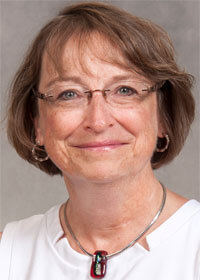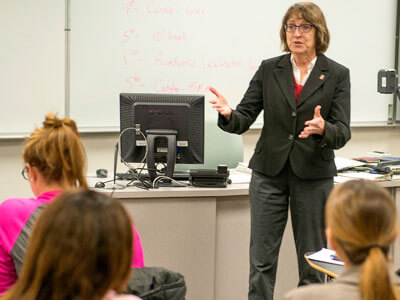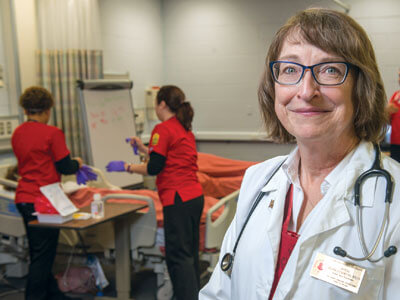Informatics. Motivational interviewing. Diversity competence. Apps. None of these terms was around when Donna Plonczynski began her nursing education career 20 years ago at Northern Illinois University.
But today her students are ready for health care’s revolutionary changes, thanks to her and her colleagues.
The NIU nursing professor is devoted to her career, as both an educator and a working nurse practitioner.
“NIU’s mission is to educate ethical, evidence-based nurses. It’s important to have faculty who are competent and respectful facilitators. That is my nursing philosophy as well: competency and respectful integration of our mutual goals and developing ways to fulfill them. My teaching and my nursing philosophies are overlapping,” Plonczynski says.
Pulse on the future
Plonczynski anticipates health care trends and prepares students for innovative careers in health care. For example, with major changes in health care insurance coverage, patient care is being managed by a continuum-approach – from wellness promotion and illness prevention, to primary care, through hospitalization and recovery. To accommodate this, NIU’s nursing programs have expanded to include courses to address the needs related to that range of care.
Additionally, Plonczynski and a colleague received a grant to develop a protocol to determine what characteristics influence people to make healthy decisions. Along with student research assistance, they developed an app for patients to receive tailored health information while they are in the waiting room, which prompts them to formulate questions to ask during their health care appointments. Feedback has been positive, Plonczynski says: the app has been helpful in educating patients and in creating conversations with health care providers.
 Metabolic syndrome – conditions such as increased blood pressure, high blood sugar, excess abdominal fat that together lead to increased stroke, diabetes and heart disease – is on the rise, Plonczynski says. One in three people in the U.S. has this syndrome, and she wants her students to be prepared.
Metabolic syndrome – conditions such as increased blood pressure, high blood sugar, excess abdominal fat that together lead to increased stroke, diabetes and heart disease – is on the rise, Plonczynski says. One in three people in the U.S. has this syndrome, and she wants her students to be prepared.
“Every student needs to provide me with a detailed motivational interviewing plan, and an exercise and nutrition plan, for someone who has metabolic syndrome because they are going to have patients with that,” Plonczynski adds.
The Internet and connectivity have also changed the way health care providers work.
“On your phone you can have so many medical resources, including interpretation of EKGs, medication choices for someone who is allergic to the first-line drug … just the most astonishing array of information,” Plonczynski says.
Learning how to effectively use new technology, as well how to work collaboratively, is key in health care. Plonczynski fosters these skills by presenting her students with real cases from her own practice for discussion. During class, students are encouraged use their electronic devices to look up answers to questions they may have, then share what they find with rest of the class. This is to help students actively participate in what they are learning.
“Students learn not only how to have professional dialogues, but to have professional disagreements. I tell them they should feel free to disagree with me,” she says. “I expect students are providing feedback and critique to each other because in a real life situation you go to a colleague and say, ‘Hmm, I need some guidance.’ ”
Tough medicine
Educating nurse practitioners at the graduate level is more rigorous than undergraduate clinical nursing. When you are working in a clinical setting you you diagnose and develop a treatment plan for patients, Plonczynski says. As an advance practice nurse, you work as part of a team, coordinating care. Nurse practitioners need to understand health interventions, evaluations and follow-ups.
“You’re the person who coordinates everyone. You know everything that is going on – from X-rays to physical therapy – and can make a plan. The role extends the impressive knowledge and skills of a nurse,” Plonczynski says.
 Coursework in advance practice nursing is difficult. Plonczynski’s students can attest to this.
Coursework in advance practice nursing is difficult. Plonczynski’s students can attest to this.
“Students tell me I’m tough … tough but fair,” she says. “Rigor is critical in what we are doing. You have people’s health in your hands and you need to take that seriously. There’s a lot of work in my courses.”
Theresa Terna agrees. Terna is pursuing her advance practice nursing degree, and has high praise for Plonczynski’s teaching.
“She epitomizes what professors should be,” Terna says. “She’s tough but approachable. She sets students up for success: If they can pass her class, they can be 99.9 percent sure they can pass their boards.”
Preparing her students to succeed is part of what has earned Plonczynski accolades and awards. She has received teaching awards at NIU, and was one of only 10 instructors state-wide to be granted an excellence in teaching award from the State of Illinois.
“Dr. Plonczynski is an award-winning faculty member who has carefully prepared hundreds of expert advanced practice nurses across the nation. She is an outstanding leader in nursing education and advanced nursing practice,” says Jan Strom, professor and chair of NIU’s School of Nursing & Health Studies.
Teaching since 1995, Plonczynski has seen revolutionary changes in health care and nursing. And that suits her fine.
“As a child, I wanted to be an astronaut,” Plonczynski says. “But I’ve found there has been a lot of groundbreaking work that has been involved in becoming a nurse practitioner while staying planted in one’s community.”

